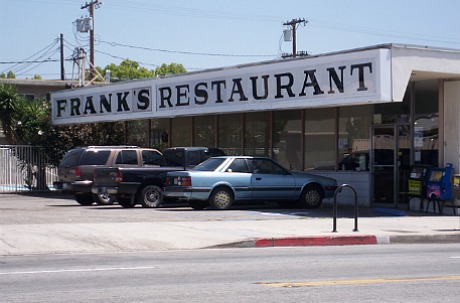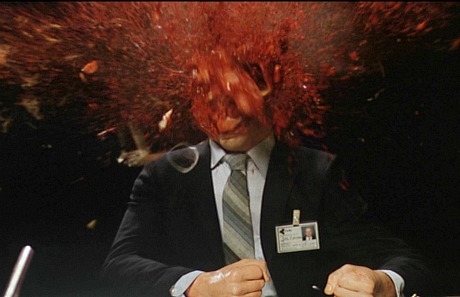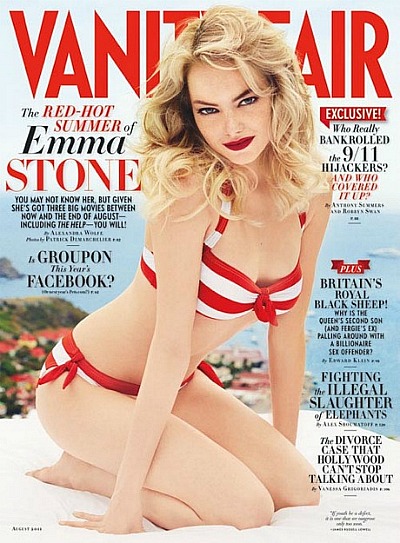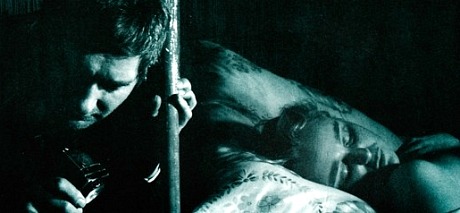A paragraph in Brad Brevet‘s pan of Larry Crowne (published early this morning) got me going. What are the likely financial particulars facing Tom Hanks‘ lovable, scooter-riding mellowhead, and does Mr. Crowne really qualify as being seriously damaged and downsized in our 2011 economy, and does he really have to abandon his one-story ranch house in order to make ends meet?
 Franks’ restaurant
Franks’ restaurant (960 Olive Ave., Burbank), where Tom Hanks’ Larry Crowne lands a job after being given the heave-ho by UMart.
“Forgotten among the cutesy gags, gentle sobs and one whole week of job-searching is Larry’s Navy pension, thanks to 20 years of service,” Brevet wrote. “We’re talking probably $30,000 a year plus benefits on top of whatever he was making at U-Mart. His time in the Navy is a point made on more than one occasion, and it begins to make me wonder how much he owes on his home. How much does he have in savings? What was the reason for the divorce? Did his wife have a job? Was she contributing to the mortgage? Was he dishonorably discharged?”
Here’s what I wrote back to Brevet this morning. Keep in mind I’ve never been all that great with numbers but I have some capabilities in this realm:
“You’ve found research supporting a belief that Tom Hanks’ Larry Crowne pulls down an annual $30 thousand pension-plus-benefits from his 20-year stint in the Navy. But I’m not so sure about this. A 2006 Navy Times article says the following:
“‘For those who entered service prior to Sept. 8, 1980, retiring at 20 years is worth a straight 50 percent of final basic pay. An E-7 with 20 years of service who entered service in 1984 [is] under the High-3 plan. His average basic pay over the past three years is $3,342 per month, and 50 percent of that average equals a retirement pension of $1,671 per month, or $20,052 per year.'”
“Let’s say Larry Crowne is 52 years old, and he joined the Navy when he was 19, or 33 years ago (i.e., in 1979) so he qualified for System 1. And let’s say he made the rank of E7 as a cook. Cooks are not officers, of course — theyr’e enlisted guys who rise up in the ranks so they’re making schlub pay. So how do you figure a $30K pension?
“But I’ll tell you what. I’ll let you have the $30K because the film makes more financial sense if Crowne’s pension is at that level. So let’s compare his salary as a cook at Frank’s Diner in Burbank (i.e., his second job in the film) vs. his salary as a UMart/WalMart employee (i.e., his job when the film begins).
“I looked at a couple of sites claiming to have statistics on the annual salary of a diner cook, and the median is $23,000 but there are cooks who make as much as $35,000.
“Let’s figure that Frank’s in Burbank (a real, very popular place) pays more than the national average and that Larry Crowne makes somewhere between $30,000 and $35,000. But he’s new on the job so let’s say $30K. The Frank’s salary plus the $30K Navy pension equals an annual income of $60K, or $1153 a week before taxes. (I’m presuming that ex-Navy guys pay taxes on their pensions?) So what’s their take-home after taxes? $950 something? $950 x 52 weeks = an actual take-home salary of $49,400.
“Larry’s estimated Walmart salary is larger than his Frank’s salary, of course, but not in a massive sense so there’s a bit of a work-around factor.
“The average Walmart salary of a manager-level employee in Arkansas is $43,000 and change, and Larry wasn’t quite managerial (although he’d been with UMart for a few years) so he was probably pulling something down in the neighborhood of $40,000 annually, perhaps closer to $38,000 or a bit less. An average income site reports that a WalMart store manager’s salary in Jacksonville, Florida, ranges from $80 to $110K, depending on sales volume, and that assistant managers start at $43K annually and cap at $63K. A customer service manager, which is closer to what Larry Crowne is (he’s definitely not managerial with a white shirt and tie) is around $43K.
“So the UMart job paid about…what, $6000 or $7000 more annually than his Franks’ job as a cook? So instead of making $30K at Franks he made $38,000 or $39,000 take-home at UMart (guesstimate), and coupled with the Navy pension he was making (while still at UMart) $68,000 or $69,000 annually, or an average weekly salary of $1326 which works out to closer to $1125 (or maybe a bit more) after taxes? That comes to roughly $60,000 take-home after taxes (or in that general neighborhood).
“To sum up — Larry Crowne is making $57,000 to $60,000 in post-taxable income when he’s at UMart (i.e., UMart plus Navy pension), and he’s making his monthly nut with this. But post-Walmart he drops down to $49,000 (i.e., Franks’ job plus Navy pension), and as a result he has to default on his mortgage payments and sell his SUV and ride a scooter to save on gas? Riding a scooter makes a lot of economic sense (I do it myself for run-arounds and errands) but why can’t he take in a boarder at his home? Some nice young guy? Or a couple of lesbians?
“How much could his monthly mortgage have been? Larry Crowne was mostly filmed in Altadena and Franks, as noted, is a real-life restaurant in Burbank so let’s say his home is in Altadena. Zillo and Yahoo Real-Estate have good averages, but a typical home in Altadena right now would go for $200,000-plus. What did he put down when he bought the house with his wife? 10% or %20? Did they buy in the ’90s? Let’s say when the movie starts his mortgage is at least $1500 per month but probably closer to $1700 or so. (Or maybe not. I haven’t had a mortgageto worry about since we sold our home in Venice in ’91.)
“Larry Crowne tells us he was able to make his nut (monthly house mortgage plus filling up that big fat SUV gas tank plus everything else) on his UMart-plus-Navy pension take-home income of $60,000, give or take. But he has to sell the house and the car and basically scale way down on $49,000 take-home. It just seems to me that he could maybe hold onto the house in a pinch.”
Brevet replies: “I got most of my numbers by talking with some people in the military. One is a naval officer and another works in the Air Force. I also used this chart to help me figure salary based on a 20-year enlisted man
“The Navy Times article you found is interesting, especially considering it comes directly from the source. But whether we’re talking $20k a year or $30k a year the problem is still that we are talking about it. Not to mention the fact he will also be receiving benefits, neither of which are addressed in the film.
“I followed the link to the Wal-Mart salaries you sent and I tried looking for that information as well and found the same things, but I could never quite figure out what Crowne’s actual job was. Some sort of a manager, but floor? Associate? I don’t know. So I left that alone, but it also begs the question how much was he making there? He was named ‘Employee of the Month’ eight times? He’s a pretty good worker and a manager of some sort.
“Also, how much did he owe on the mortgage? How much had he saved? He seems responsible and doesn’t seem to be someone who is out spending money like a mad man so I have to assume he’s been good with his money and yet after a week he has to strategically default on his mortgage?
“So if you were to say he was only get $20k a year from the Navy, plus benefits. And let’s say he was an associate manager at U-Mart, which based on some of the links you sent could bring him around $43,000. We’re talking about a guy with a house payment, benefits paid for who is pulling in $63,000 a year. A good chunk of change and a detail that is 100% left out of the movie. A pretty important detail if you ask me.
“Then you have to wonder how much his wife had already contributed to the mortgage. When did they buy the house? How much was already paid off? They wouldn’t let him refinance… but why? Times are tough? Cop out.
“By the way, I totally agree with you and your additional knowledge of the diner and location and the fact he could have easily taken in a tenant makes the whole movie ridiculous.”








